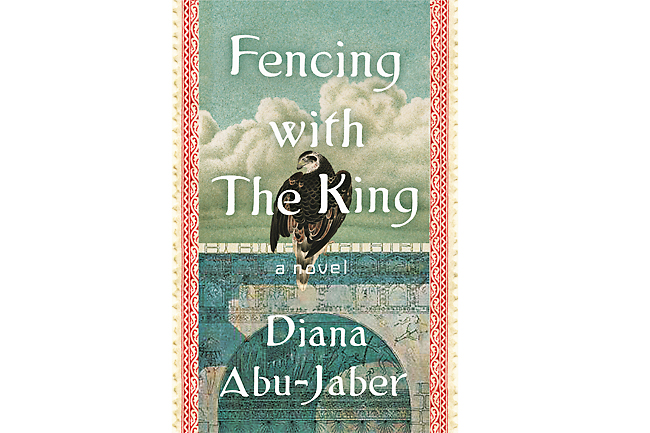Sarah Cypher
THE WASHINGTON POST – The line between realism and fable is sometimes rapier thin, especially in the family tales that inspired Diana Abu-Jaber’s eighth book, Fencing with the King. A Palestinian Jordanian immigrant, Abu-Jaber’s father was an alleged favourite fencing partner of King Hussein I in their youth.
This lore echoes through the novel’s premise. It’s 1995, and Amani Hamdan, a poet in Upstate New York, pushes her father, Gabe, to accept an incredible invitation: attend the birthday celebration of his old friend, the king of Jordan, and rekindle old memories in a fencing match. Her father has been in the United States 30 years and resists the hubbub, but Amani has found a scrap of her Palestinian grandmother’s writing, and curiosity promises escape from her own problems.
Amani’s quest to discover the truth behind the fragmented poem will lead to a family scandal involving their host at the festivities – Hafez, her “marvelous” uncle who is also the king’s right-hand man. In the month that Amani and Gabe are in Jordan, family machinations will prove subtler and more treacherous than royal birthday politics. Behind its flashy premise full of swords and falconry, Fencing with the King enacts the deft footwork of a veteran novelist reinvigorating a timeless story of rivalry over inheritance with a dash of personal history.
To write fiction about the Palestinian diaspora involves finding ways to acknowledge the fragmentation of exile – usually in the novel’s form, its situation or its characters’ lives. In this case, that fragmentation is embodied by Hafez. He has become the person with a finger on all the political chess pieces by long downplaying his mother’s Palestinian origins, but he harbours a sense of loss that manifests as a wish for control that creeps toward greed: “His needs were simple and he asked for little… His father’s knife, a bit of land.”
The urge to consolidate a legacy drives him to conceal from his brothers an enormous tract of land that’s at stake: A distant cousin has died without a will, and the property will revert to the crown unless Hafez manoeuvres the church into recognising his claim as the eldest living Hamdan male.
The plan collides with Amani’s innocent search for the family truths behind her grandmother’s poem. Her agenda is not as compulsive as her uncle’s, but she, too, seeks reconstitution – living with her parents after a divorce and having disgraced herself at the campus where she teaches. Amani seems more bewildered than burdened by this aftermath, and rather than dwell on it, she goes in search of clues and pries into forbidden wings of the house, meanwhile feeling newly wary of her once-lionised Uncle Hafez. Along with his other schemes, Hafez wants to establish her as a poet in Ammanite society so she’ll write about him.
The reader hopes to see Amani discover and resist her uncle’s more nefarious ideas head-on, and the lack of this fuller reckoning is a palpable absence. Their agendas find an indirect clash, however, in their long-lost relative Musa, who most represents the novel’s moral centre.
Discovered by Amani’s search, and a threat to Hafez’s plans for the land, Musa lives with a developmental disability and has been cared for by nuns. The novel positions him as insensible to agendas, hopelessly subject to the whims of the altruistic and the cruel. As politicking pushes Hafez toward an extreme state, Gabe wonders whether “something was not right with his brother, that he was somehow ill”, and indeed, Hafez’s ethical brokenness parallels the larger ironies of political elites undermining the people most at risk of harm, like Musa.



